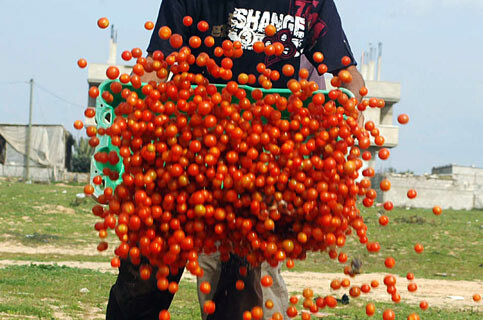Palestinian Center for Human Rights 30 January 2006

Palestinian farmers destroy vegetables grown in former Israeli settlements to protest Israel’s closure of Karni crossing in the Gaza Strip January 28, 2006. (MAANnews/Hatem Omar)
The Palestinian Centre for Human Rights expresses grave concern over the continued closure of Al-Muntar (Karni) checkpoint, east of Gaza City. The closure has halted the importation and exportation of basic goods, medicines, and other commodities. The closed checkpoint is the only commercial crossing connecting the Gaza Strip with the West Bank, Israel and the outside world.
PCHR is concerned over the potentially devastating effects of this continued closure, representing the continued strangulation of the Palestinian economy, particularly in the Gaza Strip. The Centre calls for the immediate intervention of the international community and humanitarian organizations to pressure Israel to implement the border crossings agreement signed last November, and to stop enforcing a policy of collective punishment against Palestinian civilians.
IOF closed Al-Muntar checkpoint on Saturday, 14 January 2006, under the pretext of a security warning regarding an alleged operation by Palestinian gunmen at the checkpoint and inside Israel. Palestinian farmers have sustained great losses since this time, as their produce is being held on the Palestinian side of the checkpoint. The closure coincided with the export season of strawberries, flowers, tomatoes, cucumbers, and peppers. The director of agricultural land development in the Gaza Strip announced the loss of 100 tons of agricultural produce over the past two weeks, in the greenhouses operated by the Palestinian National Authority in the Strip’s evacuated settlements.
The checkpoint’s closure prevents any commercial transactions through it. As a result, the economic and social strangulation in the Gaza Strip will worsen. Agricultural exports will stockpile and go to waste and the stock of basic food products, fuel, and construction materials in the Gaza Strip will be exhausted. Health conditions will also deteriorate, since Al-Muntar is the entry point of medical products to the Strip.
Scores of traders and farmers held a demonstration opposite the European Commission office in Gaza City. They brought the goods and produce that had expired due to the closure of the checkpoint, including cucumbers, tomatoes and flowers. In addition, they dumped some of the wasted produce in front of the building and requested that the EU pressure Israel to open the checkpoint immediately.
Over the past few years, Al-Muntar checkpoint has been closed frequently. And when the checkpoint is operational, IOF enforce complex search procedures that lead to the expiry of import and export goods, especially dairy products, fruits, and vegetables.
PCHR considers the closure of Al-Muntar checkpoint to be “collective punishment” and calls for the immediate opening of the checkpoint. The Centre notes that this policy is a violation of International Humanitarian Law. PCHR calls upon the international community to guarantee Israel’s respect its obligations under the 4th Geneva Convention.
Related Links